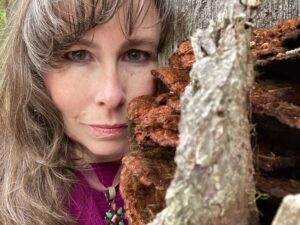Poets of the Dark: Interview with Cassondra Windwalker
 Cassondra Windwalker has roamed the South, the Midwest, the West, and currently haunts the Frozen North in the company of a tolerant husband, a zombie cat, a ghost dog, and a miscellany of ghasts who sometimes share their stories over a cup of tea (or a dram of whisky.) Her novels and full-length poetry collections are available in bookstores and online. She enjoys interacting with creatives and reasonably decent people of all sorts on Twitter @WindwalkerWrite.
Cassondra Windwalker has roamed the South, the Midwest, the West, and currently haunts the Frozen North in the company of a tolerant husband, a zombie cat, a ghost dog, and a miscellany of ghasts who sometimes share their stories over a cup of tea (or a dram of whisky.) Her novels and full-length poetry collections are available in bookstores and online. She enjoys interacting with creatives and reasonably decent people of all sorts on Twitter @WindwalkerWrite.
What sparked your interest in horror poetry? Was there a particular event or work that inspired you to delve into the darker side of poetry?
Horror poetry found me before I knew that was what it was called. One of my earliest childhood memories is of my father reading me The Raven while I sat on his lap. Everyone’s perspective is a little different, but for me, poetry is simply poetry. There exists no more harrowing horror or fundamental beauty than life itself, and poetry, well-crafted, mirrors that horror and that beauty through innumerable facets of metaphor and observation.
Can you describe your creative process when writing horror poetry? Do you have any rituals or techniques that help you tap into your darkest fears and bring them to life on the page?
My life’s practice is full immersion in the immediate. Our instincts are often to avoid what is uncomfortable or frightening or heartbreaking, but I believe the only path to true joy and interconnectedness with all that exists is through surrender to what is real. Oftentimes what is real is pretty awful. But it is never disconnected from what beauty waits on either side. To see what is horrifying, I need only to open my eyes and look around. Moving from horror to hope, finding some catalyst on which the story might turn, is the hard part. And it doesn’t always happen in every poem. Sometimes we have to sit with fear and with loneliness. Some days the darkness wins. But some days, the light does.
Finally, what advice would you give to aspiring horror poets who want to explore the genre? Are there any particular challenges or pitfalls they should be aware of, and how can they overcome them to create truly terrifying poetry?
I’m not in a position to offer advice. I can’t see the stories alive in anyone else’s head, and only they know best the lure that will coax them fully into the light. I think two keys to any poetry, though, and perhaps any writing, are these: look for what’s small, and look for what lies beneath. A photograph of a battlefield so overwhelms the eyes that it blinds them, but a photograph of bloody baby shoes on a shattered city street is both gutting and unforgettable. Look for what is smallest in the story you are telling. And look for what’s beneath. There are a thousand ways to describe the dark night, and we’ve all heard even the loveliest so many times our brain flits right over it. But what, in your story, in your moment, breathes beneath that darkness?



